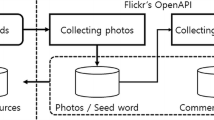Abstract
The rapid development of social media has made more and more users express their opinions, feelings, and attitudes toward various things through different forums like Twitter, WeChat, and Weibo. However, most existing works just focus on specific product categories to construct the domain ontology, which is a quite narrow use of domain ontology. We propose a new construction of domain ontology based on the semantic features of social media. The topic of posts and opinions, also known as topic-opinion pairs, are identified with the domain ontology. The sentiment polarities are determined with the help of the given sentiment polarities. The sentiment polarity of an unknown post is calculated by the weighted average of the sentiment polarities of topics and opinions contained in the post. Preliminary results show that the application of domain ontology can effectively identify the topic-opinion pairs, and according to the known polarity of posts can effectively classify the topic-opinion pairs. The accuracy of sentiment classification is increasing.
Access this chapter
Tax calculation will be finalised at checkout
Purchases are for personal use only
Similar content being viewed by others
References
Marstawi, A., Sharef, N.M., Aris, T.N.M.: Ontology-based aspect extraction for an improved sentiment analysis in summarization of product reviews. In: International Conference on Computer Modeling and Simulation, pp. 100–104. ACM, Canberra (2017)
Jung, H., Park, H.A., Song, T.M.: Ontology-based approach to social data sentiment analysis: detection of adolescent depression signals. J. Med. Internet Res. 19(7), 259 (2017)
Sreejith, D., Devika, M.P., Tadikamalla, N.S., Mathew, S.V.: Sentiment analysis of English literature using rasa-oriented semantic ontology. Ind. J. Sci. Technol. 10(24), 1–11 (2017)
Hu, M., Liu, B.: Mining opinion features in customer reviews. In: National Conference on Artificial Intelligence, pp. 755–760. AAAI Press, San Jose (2004)
Wilson, T., Hoffmann, P., Somasundaran, S.: OpinionFinder: a system for subjectivity analysis. In: Proceedings of Human Language Technology Conference and Conference on Empirical Methods in Natural Language Processing, HLT/EMNLP, Canada, pp. 347–354 (2005)
Kim, S.M., Hovy, E.: Extracting opinions, opinion holders, and topics expressed in online news media text. In: Proceedings of the Workshop on Sentiment and Subjectivity in Text, pp. 1–8. ACL, Sydney (2006)
Kobayashi, N., Inui, K., Matsumoto, Y., Tateishi, K., Fukushima, T.: Collecting evaluative expressions for opinion extraction. In: Su, K.-Y., Tsujii, J., Lee, J.-H., Kwong, O.Y. (eds.) IJCNLP 2004. LNCS, vol. 3248, pp. 596–605. Springer, Heidelberg (2005). https://doi.org/10.1007/978-3-540-30211-7_63
Zhuang, L., Jing, F., Zhu, X.Y.: Movie review mining and summarization. In: Proceedings of the 15th ACM International Conference on Information and Knowledge Management, pp. 43–50. ACM, New York (2006)
Jakob, N., Gurevych, I.: Extracting opinion targets in a single and cross-domain setting with conditional random fields. In: Conference on Empirical Methods in Natural Language Processing, Cambridge (2010)
Tan, C., Lee, L., Tang, J.: User-level sentiment analysis incorporating social networks, pp. 1397–1405. ACM, San Diego (2011)
Go, A., Bhayani, R., Huang, L.: Twitter sentiment classification using distant supervision. Cs224n Project Report, pp. 1–12 (2009)
Alexander, P., Patrick, P.: Twitter as a corpus for sentiment analysis and opinion mining. In: Proceedings of International Conference on Language Resource and Evaluation, Lisbon, pp. 1320–1326 (2010)
Barbosa, L., Junlan, F.: Robust sentiment detection on Twitter from biased and noisy data. In: Proceedings of the 23rd International Conference on Computational Linguistics, Beijing, pp. 36–44 (2010)
Davidiv, D., Tsur, O., Rappoport, A.: Enhanced sentiment learning using Twitter hashtags and smileys. In: Proceedings of the 23rd International Conference on Computational Linguistics, Beijing, pp. 241–249 (2010)
Jain, J.P., Awati, J., Alzende, H.: Opinion analysis of text on the basis of three domain classification. In: International Conference on Automatic Control and Dynamic Optimization Techniques. IEEE, Pune (2017)
Ding, S.C., Ma, M.R., Li, X.: Study of subjective sentence identification oriented to Chinese micro blog. J. China Soc. Sci. Tech. Inf. 33(2), 175–182 (2014). (in Chinese)
Ramesh, S., Duerson, D., Ephraims, T.: A Managerial Perspective on Analytics. Chinese Machine Press, Beijing (2015)
Author information
Authors and Affiliations
Corresponding author
Editor information
Editors and Affiliations
Copyright information
© 2018 Springer International Publishing AG, part of Springer Nature
About this paper
Cite this paper
Wang, D., Xu, L., Younas, A. (2018). Social Media Sentiment Analysis Based on Domain Ontology and Semantic Mining. In: Perner, P. (eds) Machine Learning and Data Mining in Pattern Recognition. MLDM 2018. Lecture Notes in Computer Science(), vol 10934. Springer, Cham. https://doi.org/10.1007/978-3-319-96136-1_3
Download citation
DOI: https://doi.org/10.1007/978-3-319-96136-1_3
Published:
Publisher Name: Springer, Cham
Print ISBN: 978-3-319-96135-4
Online ISBN: 978-3-319-96136-1
eBook Packages: Computer ScienceComputer Science (R0)




